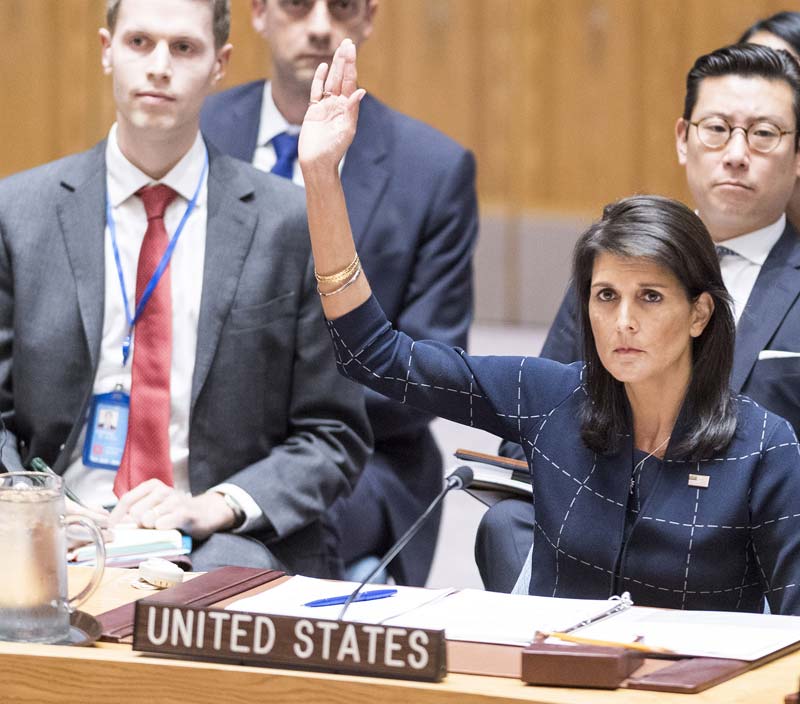 Zuma Wire
Zuma Wire
WASHINGTON - For the second time in a week, we've learned that a person who could become the next president of the United States is giving speeches for $200,000 a pop. Last week it was former vice president Joe Biden; now it's Nikki Haley, the former U.S. ambassador to the United Nations, who is quoting that price for her speeches, CNBC reports.
Everyone who does this is engaging in an increasingly dangerous gamble with their political future.
Haley appears to have more motivation than most former public servants to hit the speaking circuit. Her public financial disclosures have listed as much as $1 million in debt, though her spokesman said the more recent figure is less than $500,000. Delivering just a few speeches would seemingly wipe that clean in a hurry and allow someone who has been in public service for much of her adult life to get back in the black.
But personal justifications aside, it's hard to know the impact down the line. Haley is widely viewed as the biggest rising star in the Republican Party - perhaps the one member of the Trump administration who has escaped it with her political future intact, and how. But any presidential campaigns for her will be four, eight or even more years away.
Back in 2016, it was Hillary Clinton's many speeches (for even larger sums) that dogged her campaign for the presidency. We'll never know exactly how much it might have hurt her, but both Donald Trump and Sen. Bernie Sanders frequently pointed to those speeches and the lack of transcripts of them to suggest Clinton was too cozy with powerful interests. It fed right into the populist campaigns against her. Polling showed Americans wanted to see the transcripts by a margin of 64 percent to 19 percent, and Clinton at times struggled to justify things like taking $675,000 from Goldman Sachs.
As with many other things that could potentially have made the difference in a razor-thin race - Russia, James Comey, etc. - it's not unreasonable to think those speeches helped create a narrative that lost her the race. These are extremely fine margins.
(Of course, many former officials give paid speeches, including Barack and Michelle Obama and other former Trump officials. The calculus and political damage is very different when someone will not seek public office again.)
Biden is also something of a cautionary tale, though we have yet to see how things play out. The New York Times reported last week that Biden gave a $200,000 speech to a conservative-leaning economic group in Michigan in which he praised a vulnerable Republican congressman there, Fred Upton. Upton wound up winning a narrow reelection race. Biden has stood by his comments praising Upton, but they seem less than helpful in a potential 2020 Democratic primary campaign moving to the left.
And that's really the cautionary tale here. Even if you set aside the objections to taking an annual salary's worth of pay for one speech, there's the matter of what you said in that speech. There's the matter of what those groups that paid you might come to stand for in American politics. And the potential unintended consequences only increase as the years pass.
There was a time in our politics when you could be a lobbyist and still run for office. Then the Jack Abramoff scandal put a big dent in that. Today the actual nature of the lobbying (and to be clear, not all lobbying is created equal) is generally irrelevant as long your opponent can attach that label to you. Both of the past two presidents have run on banning lobbyists from their White Houses (both backed off that somewhat once in office).
And really, the objections to paid speeches are quite similar to the ones to being a lobbyist: You're essentially trading on your government service to enrich yourself. The well-heeled groups that pay top dollar for speeches will say they just like the idea of having a big name come speak to them, but someone like Haley can also provide insights into how the current administration works (which is invaluable, especially in the Trump era). The payments could also be seen as down payments for influence in the event that either Biden or Haley becomes president. This is an exchange of cash for cache that simply doesn't exist without past (or future) government service.
Unlike being a lobbyist, one speech does not tie you intensely to one group's priorities. But you are associating yourself with a lot of different kinds of interests. Any one of them could wind up being problematic, even if you do everything possible to guard against the diciest ones. And what happens when the American public decides this is no longer an arrangement that passes the smell test, as it largely has with lobbyists serving in influential positions?
That's a big risk to take with your political future, and politicians who are often surrounded by people making significantly more money than they are might be somewhat blinded to it.
(COMMENT, BELOW)


 Contact The Editor
Contact The Editor
 Articles By This Author
Articles By This Author